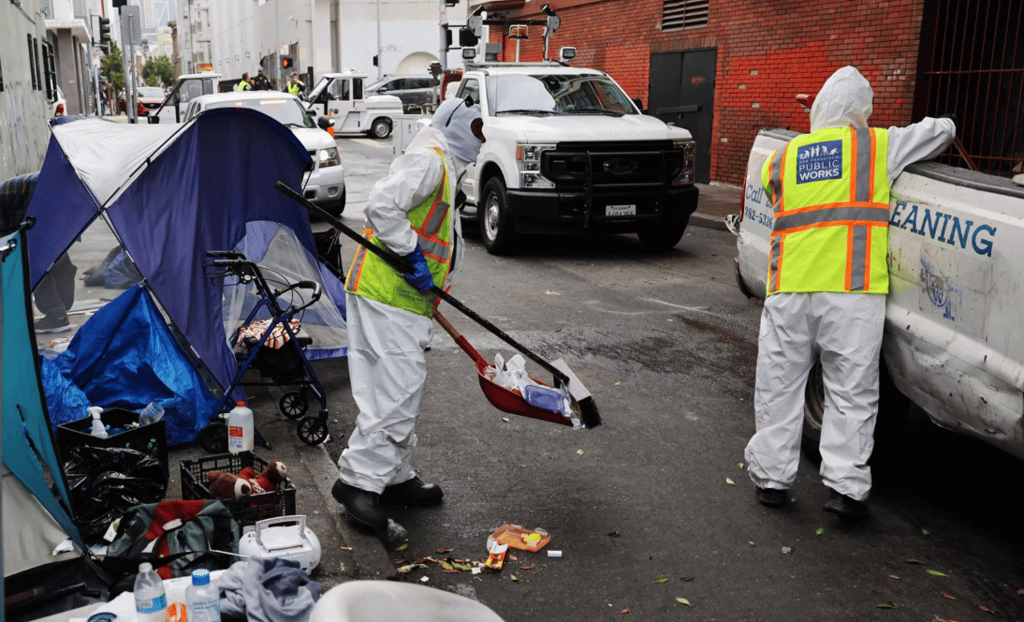San Francisco’s Homeless Encampment Crackdown: Cleaner Streets or Costly Displacement?
8/18/20254 min read


San Francisco’s Homeless Encampment Crackdown: Cleaner Streets or Costly Displacement?
By Boncopia Staff | August 17, 2025 | U.S. News & Politics
San Francisco’s streets are looking cleaner, with fewer tents dotting the sidewalks. City officials tout this as a win, pointing to a 60% reduction in homeless encampments since July 2024 and a 96% drop in District 8’s Castro neighborhood. But behind the numbers lies a heated debate: Is the city’s aggressive new approach to clearing homeless camps solving the crisis, or merely pushing it out of sight? At Boncopia, we dive into the complexities of this issue, exploring the tactics, their impact, and what they mean for the city’s future.
A New Playbook for Homelessness
In mid-2024, San Francisco ramped up its efforts to address homelessness, spurred by the U.S. Supreme Court’s Grants Pass v. Johnson ruling, which allowed cities to enforce bans on public sleeping even when shelter beds are scarce. Mayor London Breed, facing a tough reelection, rolled out a multi-department strategy involving police, public works, and outreach teams. The city now conducts encampment sweeps at least twice daily, five days a week, with advance notice and offers of shelter or services.
The approach is aggressive by design. Breed has been vocal about making life “uncomfortable” for unhoused individuals to encourage them to accept help. Tactics include issuing citations for unauthorized lodging, towing RVs, and confiscating tents. City data shows a sharp uptick in enforcement: over 1,000 arrests for public lodging in the year following the ruling, compared to just 111 the prior year. By March 2025, the city recorded its lowest tent count (222) since 2019, a stark contrast to the 8,323 homeless individuals counted in 2024.
City officials, including Mayor Daniel Lurie, who took office in January 2025, argue that these efforts are working. “Our focus is getting people off the street and into shelter, mental health, and drug treatment beds,” Lurie told CBS News. The city points to a 35% increase in sheltered homeless individuals since 2019, with nearly half of the city’s 8,000 unhoused residents now in shelters.
The Human Cost of Sweeps
But not everyone sees this as progress. Homeless advocates and unhoused residents argue that the sweeps are more about optics than solutions. A June 2025 survey of 150 homeless San Franciscans found 54% were forced to relocate, with 10% arrested for lodging violations. Many report losing critical belongings—IDs, medications, survival gear—during sweeps, making it harder to escape homelessness.
Linda Vazquez, an unhoused resident in the Tenderloin, told reporters, “They take everything—my tent, my clothes, even my meds. Then they tell me to go to a shelter that doesn’t take my dog. Where am I supposed to go?” Her story echoes a common complaint: shelters often have restrictive rules, like no pets or limited storage, leading two-thirds of unhoused individuals to reject offers.
The Coalition on Homelessness, a key critic, settled a 2022 lawsuit against the city for $2.82 million in July 2025. The agreement requires 72-hour notices for planned sweeps and documentation of seized items, but advocates say it doesn’t address the core issue: a lack of viable housing options. “Sweeps just shuffle people around,” said Jennifer Friedenbach, the coalition’s executive director. “They don’t solve homelessness; they make it worse.”
A City Divided
Public sentiment, reflected in posts on X, is polarized. Some residents and business owners applaud the cleaner streets, with one user noting, “Finally, I can walk through the Mission without tripping over tents.” Others call the approach heartless, with one post stating, “San Francisco is just hiding its homeless problem, not fixing it. Where do these people go?”
Local businesses report mixed feelings. A Castro shop owner told Mission Local, “The streets look better, but I know those people are still out there, just somewhere else.” Research backs this up: studies show encampment sweeps don’t reduce homelessness and can deepen poverty by disrupting support networks.
The city’s “bag and tag” policy, meant to store seized items for 90 days, has also come under fire. A February 2025 investigation by San Francisco Public Press found little evidence that the city follows this policy consistently, with many unhoused individuals reporting their belongings are trashed rather than stored.
The Bigger Picture
San Francisco’s approach aligns with a broader push in California. Governor Gavin Newsom’s 2024 executive order urged cities to clear encampments, citing public health and safety. While San Francisco’s tactics predate the order, they mirror its ethos: prioritize visible results. Yet, with only 4,000 shelter beds for 8,000 unhoused residents, and 793 supportive housing units either under repair or in transition, the city faces a supply-demand mismatch.
Advocates argue for more permanent housing, noting 700 unused supportive housing units could be filled with investment in repairs. “The city’s focused on sweeps when it could be fixing units,” said John Do of the ACLU. Meanwhile, enforcement continues, with police now empowered to clear smaller encampments daily, escalating from warnings to arrests.
What’s Next?
San Francisco’s crackdown has undeniably changed the city’s landscape, but at what cost? The reduction in tents is a visible win, but without addressing the shortage of affordable housing, mental health services, and addiction treatment, the problem may simply shift elsewhere. As the city navigates this crisis, the balance between compassion and enforcement remains elusive.
Thought-Provoking Questions:
Are San Francisco’s encampment sweeps a necessary step for public safety, or are they a superficial fix that ignores the root causes of homelessness?
How can cities balance the needs of housed residents and businesses with the rights of unhoused individuals?
What role should permanent housing solutions play in addressing homelessness, and how can San Francisco scale them effectively?
We’d love to hear your thoughts in the comments below. Stay informed with Boncopia for more updates on U.S. News & Politics.
hello@boncopia.com
+13286036419
© 2025. All rights reserved.